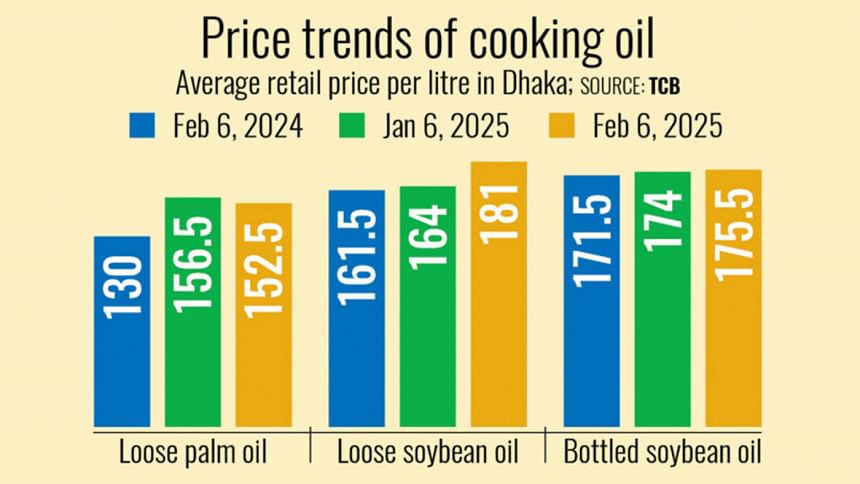Cooking oil goes missing from grocery shelves, again

Kitchen markets, including those in the capital Dhaka, are facing a shortage of both branded bottled and non-branded loose soybean oil, prompting prices to spike and causing frustration among consumers already struggling with stubbornly high inflation.
Retailers and wholesalers in several markets in major cities, including Dhaka, Chattogram and Barishal, said the oil supply has been reduced after the government rejected refiners' requests to raise prices last month.
Local refiners then cited increased import costs as the reason for seeking higher prices.
Now, the supply shortage forces consumers to search from store to store for oil, a commodity for which Bangladesh heavily relies on imports to meet its annual requirement of 24 lakh tonnes.
"I was able to buy bottled soybean oil at the third store I visited, as I couldn't find it in the first two stores in my locality," said Sabbir Hossain, a resident of Mirpur-10 in the capital.
"However, only 5-litre bottles were available. I had no choice but to buy that, even though I was looking for a smaller one," he added.
In December last year, bottled soybean oil disappeared from local kitchen markets. The situation normalised after authorities approved price hikes for the cooking staple.
"The government should investigate the matter to find the cause of this situation," Hossain added.
Several kilometres away from Mirpur-10, at Karwan Bazar, one of the largest kitchen markets in the capital, retailer Hazi Mizan said he is getting only 25 percent of the bottled soybean oil he needs daily.
Other wholesalers also reported receiving as little as 30 percent of their daily demand.
"I have heard that refiners want to increase prices before Ramadan," Mizan said.
The edible oil market, which remained relatively stable until the third week of January, has responded to the latest supply shortage.
According to official data, the price of bottled soybean oil per litre is now Tk 175 to Tk 176, marking a 1 percent increase over the past month.
Over the past week, the price of loose soybean oil per litre rose nearly 4 percent, reaching Tk 180-Tk 182 yesterday, up from Tk 174-Tk 175 per litre earlier, according to retail price data compiled by the state-run Trading Corporation of Bangladesh (TCB).
Retail prices of 2-litre bottles of soybean oil, as well as palm oil and rice bran oil, have also risen. For instance, a 1-litre bottle of rice bran oil increased by 6.41 percent to Tk 205-Tk 210 yesterday.
Wholesalers said the supply of soybean oil began to decline and its prices started to rise after the commerce ministry, during a meeting on January 22, advised refiners to refrain from increasing prices ahead of Ramadan—the month of fasting when cooking oil consumption nearly doubles.
"We are receiving only about 15 to 20 percent of the daily demand for soybean oil in our stores," said Sabbir Hasan Nasir, managing director of ACI Logistics Ltd, which runs the country's largest supermarket chain, Shwapno.
"We have heard that refineries are unable to make a profit. The price they paid for the oil is higher, and selling at the government-fixed price leaves them with no profit," he added.
Globally, prices of both palm oil and soybean oil increased in the October-December quarter of 2024 compared to the previous quarter.
Palm oil prices rose 22 percent to $1,145 per tonne in the October-December period, up from $937 per tonne in the previous quarter.
Similarly, soybean oil prices increased by 10 percent to $1,101 per tonne, according to World Bank Commodities Price Data.
To contain cooking oil prices, the interim government reduced value-added tax (VAT) twice, cutting it to 5 percent from 15 percent after taking office in August. On December 9, the authorities allowed refiners to increase prices.
Abul Hashem, an edible oil wholesaler in Moulvibazar, one of the major wholesale commodity markets in the capital, said supplies improved slightly after the December price hike.
Currently, only 25 percent of the required oil is available, with one refiner supplying over half of the demand, he added.
The government should investigate whether the rejection of refiners' demands this year led to the latest supply reduction, he said.
Abu Bakar Siddique, a wholesaler at Karwan Bazar, said some refiners are compelling them to buy other products to get soybean oil supplies.
"Otherwise, they do not deliver the cooking oil," he said.
Traders in Chattogram and Barishal raised similar concerns.
Md Ismail Hossain, a retail trader at Kazir Deuri market in Chattogram, claimed that all brands have reduced the supply of bottled soybean oil.
He said that previously, company agents supplied products four times a month, but now they are delivering only once a month.
"Moreover, even with cash payments, products are not readily available," he said.
Pana Saha, a shop owner in Barishal city, reported a similar supply crunch.
WHAT REFINERS SAY
Biswajit Saha, director of corporate and regulatory affairs at City Group, which markets the Teer brand of oil, said that their daily supply of soybean oil to the market remains unchanged at 1,507 tonnes, even under current conditions.
"We regularly provide all supply-related data to the government's monitoring cells and intelligence agencies. They also visit the factory to ensure that the supply to the market is being carried out properly," he added.
For comment, The Daily Star approached Mustafa Haider, group director of TK Group, a leading importer and commodity processor marketing the Pushti brand. However, he did not respond to calls or messages.
Taslim Shahriar, senior assistant general manager at Meghna Group of Industries, another commodity importer and processor which markets the Fresh brand of oil, said the current shortage is temporary.
"We have purchased a large quantity of soybean oil. The supply will normalise before Ramadan," he said.
Mohd Dabirul Islam Didar, head of finance and accounts at Bangladesh Edible Oil Limited (BEOL), said their supply of Rupchanda brand soybean oil to the local market remains normal.
"We supply 10,000-12,000 tonnes of oil per month. This was the figure for January, while our February supply target increases to 14,000," he told The Daily Star.
A senior official from the Bangladesh Trade and Tariff Commission (BTTC), speaking on condition of anonymity, told The Daily Star that the price of soybean oil has dropped in the international market, while imports are in line with domestic demand.
"So, there should be no oil shortage now," he said, describing the crisis as "artificially created."
However, the authorities will not tolerate any profiteering during the upcoming Ramadan, the official added.
"There will be no shortage of edible oil in the local market [during Ramadan]. The government has taken all necessary measures to ensure this."
"We plan to monitor the market over the next couple of days and hold a meeting on Sunday to look into the issues," the BTTC official added.
Blaming refiners for creating an artificial market crisis, SM Nazer Hossain, vice president of the Consumers Association of Bangladesh (CAB), said that the supply and imports of essential goods for Ramadan are usually higher than demand in most cases.
"The situation is now so volatile that it's not even possible to raise questions. If the government does not get tough, how will this be resolved?" he added.
The Daily Star attempted to reach Commerce Adviser Sk Bashir Uddin by phone, but he did not respond to calls or messages.


 For all latest news, follow The Daily Star's Google News channel.
For all latest news, follow The Daily Star's Google News channel. 





Comments